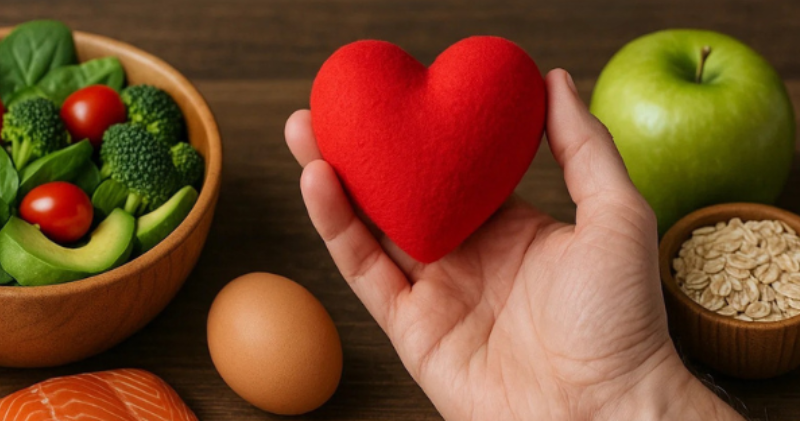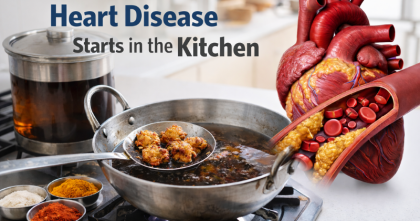What if a change in food — not a surgery — could help your heart get stronger?
Even five years ago, most doctors would have called this wishful thinking. But today, growing evidence and remarkable personal stories suggest that what we eat might play a powerful role in healing hearts, even those diagnosed with heart failure.
For many South Asian families dealing with heart problems, this news could change everything.
Understanding Heart Failure
Heart failure sounds scary, but it doesn’t mean your heart has stopped working. It means your heart has become weak and can’t pump blood effectively throughout your body.
Traditional treatments include:
- Medications to reduce workload on the heart
- Devices like pacemakers
- Sometimes surgery
- Lifestyle changes like reducing salt
Most people believe heart failure only gets worse over time. But exciting new evidence suggests that, in some cases, the heart can actually get stronger and function better — and food choices appear to play a crucial role.
The Plant-Based Diet Connection
At the center of these healing stories is something called a whole-food, plant-based diet. But what exactly does that mean?
A whole-food plant-based diet focuses on:
- Vegetables (especially leafy greens)
- Fruits (especially berries)
- Legumes (beans, lentils, chickpeas)
- Whole grains (brown rice, oats, whole wheat)
- Potatoes and other starchy vegetables
- Nuts and seeds in moderate amounts
It avoids or strictly limits:
- Meat (especially red and processed meat)
- Dairy products (milk, cheese, butter)
- Eggs
- Processed oils
- Sugary foods and refined carbohydrates
This isn’t about becoming “vegan” for ethical reasons. It’s about giving your heart the most healing, anti-inflammatory fuel possible.
According to Dr. Kim Williams, former president of the American College of Cardiology, “There are two kinds of cardiologists: vegans, and those who haven’t read the data.” This striking statement from a leading heart doctor shows how strong the evidence has become.
Real People, Real Results
Some of the most powerful evidence comes from real people who have transformed their heart health through diet changes:
- A 77-year-old woman scheduled for open-heart surgery saw her cholesterol drop 100 points after just one month on a plant-based diet. Her doctors canceled the surgery because her heart was functioning so much better.
- A man who couldn’t walk a single block without chest pain and shortness of breath eventually worked his way up to jogging 4 miles — symptom-free — after several weeks on a whole-food, plant-based diet.
- A woman with severe heart failure and an ejection fraction of only 25% (normal is 55-70%) normalized her heart function and reversed her type 2 diabetes through dietary changes.
- A man improved his heart’s ejection fraction from a concerning 35% to normal range in just 6 weeks after changing what he ate.
These aren’t isolated cases. Organizations like The Plantrician Project have documented hundreds of similar stories from people who’ve improved serious heart conditions through diet changes.
What Science Is Showing
These success stories are backed by scientific research:
The most compelling evidence comes from a 30-year randomized controlled trial led by Dr. Dean Ornish. This study showed that a plant-based diet, combined with stress management and moderate exercise, could actually reverse heart disease. In fact, 82% of patients showed measurable reversal of coronary artery blockages — without surgery or cholesterol-lowering drugs.
Follow-up studies have found that:
- Inflammation markers decrease significantly on plant-based diets
- Blood pressure often normalize
- Cholesterol levels improve dramatically
- Insulin resistance (linked to diabetes) often reverses
- Heart function measures like ejection fraction can improve
What’s especially encouraging is that many people start seeing improvements within weeks, not years.
Being Realistic: The Limits and Possibilities
These stories are real, but they’re not magic — they take consistency and commitment. It’s also important to understand:
- Not everyone will see the same results
- These are case reports, not guaranteed outcomes
- Results may vary based on how long you’ve had heart problems
- Some damage from heart attacks may not be reversible
But even with these caveats, these cases show what’s possible — especially for people in early or stable stages of heart failure. And unlike risky procedures, eating more plants has only positive “side effects”: better digestion, clearer skin, improved energy, and reduced risk of other diseases.
Small Steps You Can Take Today
Changing your diet doesn’t have to happen overnight. Here are some practical ways to start:
- Try one fully plant-based meal each day — perhaps a breakfast of oatmeal with berries, or dinner with dal, brown rice, and vegetables
- Reduce dairy products — try unsweetened almond milk or oat milk instead
- Cut back on fried snacks and sweets — replace with fresh fruit, roasted chickpeas, or nuts
- Cook more at home — restaurant food often contains hidden oils, salt, and sugar
- Add powerful anti-inflammatory ingredients like turmeric, garlic, ginger, and green leafy vegetables to your meals
- Watch documentaries like “Forks Over Knives” for motivation and recipe ideas
- Visit PlantricianProject.org for success stories and resources
Most importantly, talk to your doctor about trying a plant-based approach alongside your medications. Many doctors now support this approach and can monitor your progress.
Especially Important for South Asians
This information is particularly valuable for South Asian communities because:
- Heart disease affects South Asians at earlier ages than other groups
- Our traditional diets can be high in ghee, dairy, and oils
- Many of our family members already have diabetes, which complicates heart conditions
- Plant foods like lentils, vegetables, and spices are already familiar in our cuisine
Many South Asians have successfully adapted their traditional recipes to be heart-healthy by:
- Using pressure cookers for oil-free cooking
- Replacing dairy with coconut milk or cashew cream
- Focusing on lentils, vegetables, and whole grains
- Using spices liberally for flavor instead of added fats
Your Heart, Your Choice
It’s your body. It’s your life. But we all deserve honest advice — especially when healing might be as close as your plate.
If you’re dealing with heart failure, or love someone who is, consider exploring this approach. Share this post with parents, uncles, aunties, or friends who think they’re “too old” to change. The power of food as medicine knows no age limit.
Remember: A diagnosis is not a destiny. With each meal, you have an opportunity to send healing to your heart.




